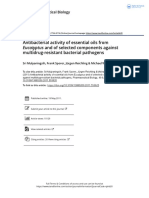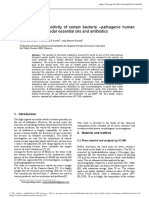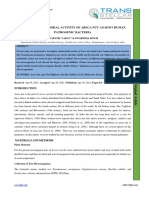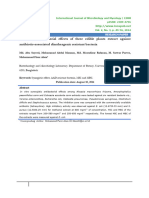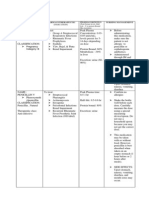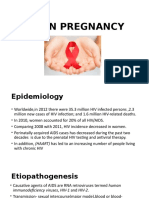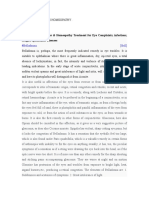Comparative in Vitro Study of The Antimicrobial Efficacy of Nigella Sativa Seed Oil (Black Seed Oil) Against Selected Microorganisms With Conventional Antibitics
Comparative in Vitro Study of The Antimicrobial Efficacy of Nigella Sativa Seed Oil (Black Seed Oil) Against Selected Microorganisms With Conventional Antibitics
Copyright:
Available Formats
Comparative in Vitro Study of The Antimicrobial Efficacy of Nigella Sativa Seed Oil (Black Seed Oil) Against Selected Microorganisms With Conventional Antibitics
Comparative in Vitro Study of The Antimicrobial Efficacy of Nigella Sativa Seed Oil (Black Seed Oil) Against Selected Microorganisms With Conventional Antibitics
Original Title
Copyright
Available Formats
Share this document
Did you find this document useful?
Is this content inappropriate?
Copyright:
Available Formats
Comparative in Vitro Study of The Antimicrobial Efficacy of Nigella Sativa Seed Oil (Black Seed Oil) Against Selected Microorganisms With Conventional Antibitics
Comparative in Vitro Study of The Antimicrobial Efficacy of Nigella Sativa Seed Oil (Black Seed Oil) Against Selected Microorganisms With Conventional Antibitics
Copyright:
Available Formats
Volume 4, Issue 9, September – 2019 International Journal of Innovative Science and Research Technology
ISSN No:-2456-2165
Comparative in Vitro Study of the Antimicrobial
Efficacy of Nigella Sativa Seed Oil (Black Seed Oil)
Against Selected Microorganisms with
Conventional Antibitics
A.D.H. Sudesh, D.N. Wanigasekara, E.D.C. Karunarathne
Gampaha Wickramarachchi Ayurveda Institute
University of Kelaniya
Yakkala, Sri Lanka
Abstract:- This study investigates the antimicrobial microorganisms can be used to delay the emergence of
activity of essential oil obtained from Nigella sativa seeds antibiotic resistance and as successful antimicrobials [5].
(Black seed oil). The objectives are to determine the
antimicrobial efficacy of black seed oil against selected Pharmaceutical concerns invest resources for discovery
pathogens such as Pseudomonas aeruginosa (ATCC programs of novel compounds with considerable
27853), Methicillin Resistant Staphylococcus aureus antimicrobial activity [6]. There is a significant trend to
(MRSA), Methicillin sensitive Staphylococcus aureus determine the antimicrobial potential of untapped natural
(MSSA), Staphylococcus pyogenes (ATCC 19615), sources such as plants, animals and microorganisms for a
Escherichia coli (ATCC 25922 and ATCC 35218) and new generation of antimicrobials [7].
clinically isolated Candida albicans and to compare the
ability of microbial growth inhibition with conventional Although there are 300,000 herbal species that present
antibiotics that are used for the test organisms. Bacteria globally, only 15% plant species have been investigated for
were inoculated on Mueller Hinton Agar and Sabouraud their pharmacological potential [8]. Among various plants
Dextrose Agar was used to inoculate C. albicans. Agar that possess medicinal value, Nigella sativa L. (Black cumin
well diffusion technique was used to evaluate or black seed in English) which belongs to the family
antimicrobial activity of the test organisms. As Dimethyl Ranunculaceae has been considered as one of the most
sulfoxide (DMSO) was served as the solvent for black precious herb around the world [9]. Black cumin seed is
seed oil, it was used as the negative control. Among the widely used in traditional medicine for wide range of
test organisms, staphylococci; MRSA, MSSA, S. ailments [10].
pyogenes and C. albicans were sensitive to the oil. Both
two strains of E.coli, P. aeruginosa were resistant to the This study was conducted with the aims of determining
oil while all test organisms were susceptible to the the antimicrobial effect of black seed oil against selected
antibiotics used. The comparative study revealed that all strains of pathogenic bacteria and yeast and to compare the
three staphylococci are more susceptible to black seed oil antimicrobial efficacy with conventional antibiotics that are
than amoxicillin in tested concentration. effective against the tested pathogens.
Keywords:- Nigella Sativa; Black Seed Oil; Antimicrobial II. MATERIALS AND METHODS
Activity; Antibitic Resistance.
A. Sample Preparation
I. INTRODUCTION
Black seed oil test sample preparation
Emergence of resistance in pathogenic microorganisms Commercially available black seed oil (Manufacturer;
to antibiotics that are used to treat serious infections causes Bio Extracts (Pvt) Ltd, Colombo 3, Sri Lanka) was mixed
considerably increased mortality [1]. After the introduction with DMSO (Dimethyl sulfoxide) to the ratio of (9:1)
of antibiotics, the antibiotic resistance genes of both aseptically.
pathogens and commensals have been widespread
throughout the environments like hospitals, communities Microbial culture preparation
etc. [2]. In addition, organisms have been acquiring multi- Pseudomonas aeruginosa (ATCC 27853), Methicillin
drug resistance during the past few years [3].Those multi- Resistant Staphylococcus aureus (MRSA), Methicillin
drug resistant bacteria can cause serious, incurable infections sensitive Staphylococcus aureus (MSSA), Staphylococcus
[4]. pyogenes (ATCC 19615), Escherichia coli (ATCC 25922
and ATCC 35218) and clinically isolated Candida albicans
Novel alternative approaches should be introduced to were inoculated in sterilized test tubes containing Nutrient
face the challenge of antibiotic resistance. Development of Broth separately and incubated overnight at 37oC. After
new effective strategies against antibiotic resistant incubation, cultures were adjusted by adding sterilized
IJISRT19SEP1426 www.ijisrt.com 458
Volume 4, Issue 9, September – 2019 International Journal of Innovative Science and Research Technology
ISSN No:-2456-2165
peptone water until turbidity matched that of a McFarland “BSO”, “+” and “-”. 50 µL of black seed oil test sample was
0.5 standard. added to all wells labeled as BSO. Ciprofloxacin (50 μL; 10
mg/mL) was added to the wells that are named as “+” of P.
Antibiotic solution preparation aeruginosa inoculated agar plates. Amoxicillin (50 μL; 10
mg/mL) was added to the “+” labeled wells of the agar
Preparation of Amoxicillin plates inoculated with Methicillin Resistant Staphylococcus
Amoxicillin powder was dissolved in sterile distilled aureus (MRSA), Methicillin sensitive Staphylococcus
water aseptically to obtain the concentration of 10 mg/ mL aureus (MSSA), Staphylococcus pyogenes (ATCC 19615),
Escherichia coli (ATCC 25922 and ATCC 35218). “+”
Preparation of Ciprofloxacin wells of the C. albicans inoculated plates were added with
Ciprofloxacin powder was dissolved in sterile distilled fluconazole (50 μL; 2.5 mg/mL). All the wells named as “-”
water aseptically to obtain the concentration of 10 mg/mL were filled with 50 μL aliquots of DMSO. The test was
triplicated for all microorganisms used.
Preparation of Fluconazole
Fluconazole powder was dissolved in sterile distilled Agar plates were incubated at 370C for 24 hours.
water aseptically to obtain the concentration of 2.5 mg/mL Antimicrobial efficacy of black seed oil and antibiotics were
evaluated using the inhibition zone diameter around the
Inoculation of microbial lawns respective wells that indicated as clear zones. Average was
Aliquots (100 µL each) of turbidity adjusted broth taken from the all three diameters of each triplicate.
cultures of Pseudomonas aeruginosa(ATCC 27853),
Methicillin Resistant Staphylococcus aureus (MRSA),
Methicillin sensitive Staphylococcus aureus (MSSA),
Staphylococcus pyogenes (ATCC 19615), Escherichia coli III. RESULTS AND DISCUSSION
(ATCC 25922 and ATCC 35218) were pipetted out onto
Mueller-Hinton agar plates separately and swabbed Bactericidal activity of Black seed oil was assessed for
uniformly over the agar surface using sterile cotton swabs to six strains of bacteria and one strain of yeast. The
obtain lawns. antimicrobial activity and the potency of black seed oil and
antibiotics were quantitatively assessed by the presence or
100 µL aliquot of Candida albicans culture with absence of inhibition zone and zone diameter. According to
adjusted turbidity was pipetted out onto Sabouraud Dextrose the obtained results, black seed oil was effective against all
Agar and inoculated evenly as mentioned above. tested Staphylococci while it was unable to affect the growth
of two E.coli strains and P. aeruginosa. The growth of the
B. Screening antimicrobial activity of black seed oil and yeast was also affected by black seed oil. All strains used
antibiotics were susceptible to the respective antibiotics. DMSO which
Agar well diffusion method was used to determine the was used as the negative control did not exhibit any
antimicrobial efficacy of black seed oil and antibiotics. inhibition against the tested organisms. The results were
Three wells (diameter 8 mm) were made on each inoculated recorded in Table 1.
agar plate using a sterile cork borer. Wells were labeled as
Fig 1:- Sensitivity testing showing clear zones on Mueller Hinton Agar inoculated with MRSA
IJISRT19SEP1426 www.ijisrt.com 459
Volume 4, Issue 9, September – 2019 International Journal of Innovative Science and Research Technology
ISSN No:-2456-2165
Inhibition zone diameter in mm
Organism
Black seed oil Antibiotic
MRSA 42.33±0.58 12.33±0.58
MSSA 37.67±0.58 28.27±0.58
S. pyogenes 38.33±0.58 34.33±0.58
P. aeruginosa Nil 34.33±0.58
E. coli
Nil 36.33±0.58
(ATCC 25922)
E. coli
Nil 36.00±0.58
(ATCC 35218)
C. albicans 21.00±0.00 35.00±0.00
Table 1:- Antimicrobial activity of black seed oil and antibiotics
DMSO (Dimethyl Sulfoxide) was used as the solvent to thymol [13], thymoquinone [14] and thymohydroquinone
dissolve Black seed oil. Therapeutic substances that are [15] that is known to possess antimicrobial effectiveness.
insoluble in water are probably soluble in DMSO and its high
diffusibility [11] helps to penetrate the test sample through IV. CONCLUSION
the agar medium. To check whether there is an effect of
DMSO towards microbial growth, it was used as the negative Black seed oil possesses considerably higher
control which confirmed that it does not affect the growth of antibacterial effect against MRSA, MSSA and S. pyogenes
tested organisms. (ATCC 19615) than the tested antibiotics. It also affects the
growth of clinically isolated C. albicans strain but the
Black seed oil exhibited significant inhibitory action reference antibiotic is more effective. Black seed oil does not
against MRSA compared to the standard amoxicillin. This affect the growth of Escherichia coli (ATCC 25922 and
result indicates that the antimicrobial action of black seed oil ATCC 35218) and Pseudomonas aeruginosa (ATCC 27853).
is not interfered with the antibiotic resistance. It might Although black seed oil is used for typical application in
possess different modes of action regarding inhibition on test traditional medicine, further studies should be carried out to
organism. evaluate the systemic use and safety of use.
Although growth of Methicillin sensitive REFERENCES
staphylococcus aureus (MSSA) was inhibited by both
Amoxicillin and black seed oil, when considering the extent [1]. Heike von Baum, Reinhard Marre, 2005.
of inhibition, black seed oil exhibited higher capability of Antimicrobial resistance of Escherichia coli and
inhibition. therapeutic implications. International Journal of
Medical Microbiology, Issue 295, pp. 503-508.
Clinically isolated Candida albicans strain was found [2]. Levy, S. B., 2005. Antibiotic resistance—the problem
to be sensitive to Black seed oil. However, quantitatively intensifies. Advanced Drug Delivery Reviews, Issue 57,
anticandidal activity of fluconazole was higher than that of p. 446– 1450.
black seed oil. [3]. Meyer KS, Urban C, Eagan JA, et al. Nosocomial
Outbreak of Klebsiella Infection Resistant to Late-
Both two E.coli strains showed no susceptibility to Generation Cephalosporins. Ann Intern Med.
black seed oil. They were sensitive to Amoxicillin exhibiting 1993;119:353–358.
approximately similar zone diameters. [4]. Cohen, M.L., 1992. Epidemiology of drug resistance:
implications for a post—antimicrobial
S. pyogenes showed to be sensitive to both black seed era. Science, 257(5073), pp.1050-1055.
oil and Amoxicillin. Inhibition zone diameter of black seed [5]. Sadiku, E.R., Fasiku, V., Agboola, O., Ibrahim, I.D.,
oil is larger than the diameter of the antibiotic which Daramola, O.O., Olajide, J.L., Kupolati, W.K., Sanni,
indicates higher inhibitory action of black seed oil on S. S. and Mochane, M.J., Overcoming Antimicrobial
pyogenes. Resistance: New Strategies, Expectations: Greater
Hope. Biomedical Journal, 1, p.5.
P. aeruginosa (ATCC 27853) was found to be resistant [6]. Payne, D.J., Gwynn, M.N., Holmes, D.J. and
to black seed oil while it was susceptible to ciprofloxacin. Pompliano, D.L., 2007. Drugs for bad bugs:
confronting the challenges of antibacterial
Almost all antibiotics are secondary metabolites of soil discovery. Nature reviews Drug discovery, 6(1), p.29.
bacteria and fungi [12].Evaluation of the potency of plant [7]. Taylor, P.W., 2013. Alternative natural sources for a
derived products is particularly relevant to the discovery of new generation of antibacterial agents. International
new antimicrobial drugs. journal of antimicrobial agents, 42(3), pp.195-201.
[8]. De Luca, V., Salim, V., Atsumi, S.M. and Yu, F.,
Antimicrobial activity of black seed oil may be due to 2012. Mining the biodiversity of plants: a revolution in
the presence of active phytochemical substances such as the making. Science, 336(6089), pp.1658-1661.
IJISRT19SEP1426 www.ijisrt.com 460
Volume 4, Issue 9, September – 2019 International Journal of Innovative Science and Research Technology
ISSN No:-2456-2165
[9]. Takruri, H.R. and Dameh, M.A., 1998. Study of the
nutritional value of black cumin seeds (Nigella
sativaL). Journal of the Science of Food and
Agriculture, 76(3), pp.404-410.
[10]. Yimer, E.M., Tuem, K.B., Karim, A., Ur-Rehman, N.
and Anwar, F., 2019. Nigella sativa L.(Black Cumin):
A Promising Natural Remedy for Wide Range of
Illnesses. Evidence-Based Complementary and
Alternative Medicine, 2019.
[11]. Brayton, C.F., 1986. Dimethyl sulfoxide (DMSO): a
review. The Cornell Veterinarian, 76(1), pp.61-90.
[12]. Fischbach, M.A. and Walsh, C.T., 2009. Antibiotics
for emerging pathogens. Science, 325(5944), pp.1089-
1093.
[13]. Randhawa, M.A. and Al-Ghamdi, M.S., 2002. A
review of the pharmacotherapeutic effects of Nigella
sativa. Pak J Med Res, 41(2), pp.77-83.
[14]. Kahsai, A.W., 2003. Isolation and characterization of
active ingredients from Nigella sativa for antibacterial
screening.
[15]. El-Fatatry, H.M., 1975. Isolation and structure
assignment of an antimicrobial principle from the
volatile oil of Nigella sativa L. seeds. Die
Pharmazie, 30(2), pp.109-111.
[16]. Karapinar, M. and Aktuǧ, Ş.E., 1987. Inhibition of
foodborne pathogens by thymol, eugenol, menthol and
anethole. International Journal of Food
Microbiology, 4(2), pp.161-166.
[17]. Ahmad, I. and Beg, A.Z., 2001. Antimicrobial and
phytochemical studies on 45 Indian medicinal plants
against multi-drug resistant human pathogens. Journal
of ethnopharmacology, 74(2), pp.113-123.
[18]. Nascimento, G.G., Locatelli, J., Freitas, P.C. and Silva,
G.L., 2000. Antibacterial activity of plant extracts and
phytochemicals on antibiotic-resistant
bacteria. Brazilian journal of microbiology, 31(4),
pp.247-256
IJISRT19SEP1426 www.ijisrt.com 461
You might also like
- Lab Diagnosis of Fungal InfectionDocument31 pagesLab Diagnosis of Fungal InfectionVysakh P RNo ratings yet
- Difficulties in Complete Denture Construction & Solutions IIDocument13 pagesDifficulties in Complete Denture Construction & Solutions IIIndrani DasNo ratings yet
- Obstetrics & Gynecologyc MnemonicsDocument12 pagesObstetrics & Gynecologyc MnemonicsMuhammad Luqman Nul HakimNo ratings yet
- In Vitro Investigation of The Antibacterial Activity of Nigella Sativa Oil On Some of The Most Commonly Isolated Bacteria in Otitis Media and ExternaDocument5 pagesIn Vitro Investigation of The Antibacterial Activity of Nigella Sativa Oil On Some of The Most Commonly Isolated Bacteria in Otitis Media and ExternaAnggie DiniayuningrumNo ratings yet
- 27 Vol9Document6 pages27 Vol9Amine BenineNo ratings yet
- Potential Antibacterial Potential of Moringa Olifera against Multidrug Resistant Wound Infecting BacteriaDocument4 pagesPotential Antibacterial Potential of Moringa Olifera against Multidrug Resistant Wound Infecting BacteriaInternational Journal of Innovative Science and Research TechnologyNo ratings yet
- Owaidetal 2015Document6 pagesOwaidetal 2015Eghosa AlariNo ratings yet
- Antimicrobial Activity of Essential Oil Extract of Ocimum Basilicum L. Leaves On A Variety of PathogDocument4 pagesAntimicrobial Activity of Essential Oil Extract of Ocimum Basilicum L. Leaves On A Variety of PathogAna TorresNo ratings yet
- Comparison of Antimicrobial Activities of Clove Oil & Its Extract On Some Food Borne MicrobesDocument7 pagesComparison of Antimicrobial Activities of Clove Oil & Its Extract On Some Food Borne MicrobesSeema YadavNo ratings yet
- Antibacterial Effect of Cassia Fistula Extract On Pathogenic Bacteria of Veterinary ImportanceDocument5 pagesAntibacterial Effect of Cassia Fistula Extract On Pathogenic Bacteria of Veterinary ImportanceAsif MajeedNo ratings yet
- WaelMohamedAbuEl WafaandWalaaSaidMohamedAbdEl AllDocument13 pagesWaelMohamedAbuEl WafaandWalaaSaidMohamedAbdEl AllCarl Ritchie TempleNo ratings yet
- Penting AromadendeDocument8 pagesPenting AromadendeAizhuuaf TurquoiseNo ratings yet
- BPJ_Vol_10_No_3_p_1101-1107Document7 pagesBPJ_Vol_10_No_3_p_1101-1107aakankshathakur698No ratings yet
- Evaluation of Preservative EffectivenessDocument6 pagesEvaluation of Preservative EffectivenessSergio RenouNo ratings yet
- Antimicrobial Activity of Essential Oil of Eucalyptus Globulus Against Fish Pathogenic BacteriaDocument4 pagesAntimicrobial Activity of Essential Oil of Eucalyptus Globulus Against Fish Pathogenic BacteriaLaires AraujoNo ratings yet
- Rosemary AntibacterialDocument5 pagesRosemary AntibacterialNurul Izzah Wahidul AzamNo ratings yet
- Agriculture and Biosciences: Nternational Ournal ofDocument3 pagesAgriculture and Biosciences: Nternational Ournal ofGabriel TrujilloNo ratings yet
- 2-7-178-878Document3 pages2-7-178-878emonasalimNo ratings yet
- 08-Ajpcr 44220 20220331 V1Document7 pages08-Ajpcr 44220 20220331 V1ravigeeNo ratings yet
- Suay 2000 ATMB BasidyoDocument11 pagesSuay 2000 ATMB Basidyoinositol66No ratings yet
- VaralakDocument7 pagesVaralaknurul islamNo ratings yet
- Antimicrobial Activity of Nigella Sativa Seed ExtractDocument5 pagesAntimicrobial Activity of Nigella Sativa Seed ExtractDian Takwa HarahapNo ratings yet
- mbl-48-2-148Document10 pagesmbl-48-2-148Handan BaysalNo ratings yet
- Rani2017 PDFDocument4 pagesRani2017 PDFandiNo ratings yet
- 2007.60-64 Sereh Sebagai AntibakteriDocument5 pages2007.60-64 Sereh Sebagai AntibakteriDeni oktaviaNo ratings yet
- Agar Well Diffusion MTDDocument7 pagesAgar Well Diffusion MTDRoland GealonNo ratings yet
- Jurnal EucalyptusDocument15 pagesJurnal EucalyptusTesaaulia BaharuddinNo ratings yet
- Cell Surface Hydrophobicity, and Production of Proteinase and Hemolysin in Candida AlbicansDocument0 pagesCell Surface Hydrophobicity, and Production of Proteinase and Hemolysin in Candida AlbicansAryanto DedyNo ratings yet
- Bacterial Infection in Pressure Injury Evaluating in Vitro Antimicrobial Activity of Natural ExtractsDocument3 pagesBacterial Infection in Pressure Injury Evaluating in Vitro Antimicrobial Activity of Natural Extractsgiani.cavalcanteNo ratings yet
- Kavitha Et Al PDFDocument5 pagesKavitha Et Al PDFDaris UntoroNo ratings yet
- In Vitro Evaluation of The Antibiogramic Activities of The Seeds of Myristica FragransDocument6 pagesIn Vitro Evaluation of The Antibiogramic Activities of The Seeds of Myristica FragransAndry LarsenNo ratings yet
- Antibiotic Susceptibility Test and Mic DeterminationDocument12 pagesAntibiotic Susceptibility Test and Mic DeterminationankitapearlNo ratings yet
- MDR 2011 0080 PDFDocument12 pagesMDR 2011 0080 PDFPatriciaCardosoNo ratings yet
- Artikel JurnalDocument5 pagesArtikel Jurnalsalman fardNo ratings yet
- Gendent - jf19 - de Oliveira S IDocument5 pagesGendent - jf19 - de Oliveira S IAndreea RoxanaNo ratings yet
- Aromateraphy VeterinaryDocument10 pagesAromateraphy VeterinaryPatriciaCardosoNo ratings yet
- Me NTH ADocument4 pagesMe NTH ASoumitra NathNo ratings yet
- 14Document4 pages14seema yadavNo ratings yet
- GJBB V342014 2Document4 pagesGJBB V342014 2paulinemahlangu88No ratings yet
- file (1)Document17 pagesfile (1)Anahi BordonNo ratings yet
- Antimicrobial Activity of Citronella Essential Oil On Antimicro Bial Drugresistant Bacteria From Veterinary Clinical Cases Cmbo 10001062 PDFDocument9 pagesAntimicrobial Activity of Citronella Essential Oil On Antimicro Bial Drugresistant Bacteria From Veterinary Clinical Cases Cmbo 10001062 PDFPatriciaCardosoNo ratings yet
- E3sconf Vigisan 01032Document5 pagesE3sconf Vigisan 01032Yassine MOUNIANENo ratings yet
- Journal of Vocational Health StudiesDocument4 pagesJournal of Vocational Health Studiesmaria oliviaNo ratings yet
- Acc Clove PDFDocument7 pagesAcc Clove PDFRia MayantiNo ratings yet
- Antibacterial Activity of Eucalpytus Citriodora Hk. Oil On Few Clinically Important BacteriaDocument3 pagesAntibacterial Activity of Eucalpytus Citriodora Hk. Oil On Few Clinically Important BacteriaMuminovićNo ratings yet
- 2006 SaxenaDocument9 pages2006 SaxenaCarlos Omar García HernandezNo ratings yet
- Research ArticleDocument11 pagesResearch Articleazurah pratiwiNo ratings yet
- 58-Article Text-269-1-10-20200406Document5 pages58-Article Text-269-1-10-20200406New CertificateNo ratings yet
- 1476 0711 12 26Document8 pages1476 0711 12 26Mandar RasaneNo ratings yet
- In Vitro Antimicrobial Activity of Areca Nut Against Human Pathogenic BacteriaDocument4 pagesIn Vitro Antimicrobial Activity of Areca Nut Against Human Pathogenic BacteriaTJPRC PublicationsNo ratings yet
- A Comparative Study of Effect of EssentiDocument5 pagesA Comparative Study of Effect of Essentidebby elizafitriNo ratings yet
- Aureus Bacteria Were at Concentrations of 20% That Were Categorized As Moderate and 100%Document5 pagesAureus Bacteria Were at Concentrations of 20% That Were Categorized As Moderate and 100%khairunnisa 3bakNo ratings yet
- Gupta Et AlDocument4 pagesGupta Et Almfed0106No ratings yet
- Synergistic Antibacterial Effects of Three Edible Plants Extract Against Antibiotic-Associated Diarrheagenic Resistant BacteriaDocument8 pagesSynergistic Antibacterial Effects of Three Edible Plants Extract Against Antibiotic-Associated Diarrheagenic Resistant BacteriaOpenaccess Research paperNo ratings yet
- Pharmacological Activities of Essential Oil Extracted From Viola Patrinii Against Some Gram Positive and Gram Negative Bacteria As Well Fungal StrainsDocument6 pagesPharmacological Activities of Essential Oil Extracted From Viola Patrinii Against Some Gram Positive and Gram Negative Bacteria As Well Fungal StrainsInternational Journal of Innovative Science and Research TechnologyNo ratings yet
- NeemDocument8 pagesNeemjerubandivamshi23No ratings yet
- Antimicrobial Property of Over-the-Counter Essential Oils and Ayurvedic Powders Against Aeromonas Hydrophila Isolated From Labeo RohitoDocument4 pagesAntimicrobial Property of Over-the-Counter Essential Oils and Ayurvedic Powders Against Aeromonas Hydrophila Isolated From Labeo RohitoInternational Journal of Innovative Science and Research Technology100% (1)
- Antibacterial Activity of Selected Plant Extracts On MethicillinDocument15 pagesAntibacterial Activity of Selected Plant Extracts On Methicillina abeNo ratings yet
- 1343 Bbassiana MetabolitDocument3 pages1343 Bbassiana MetabolitRaúl Fernando Ruiz VillegasNo ratings yet
- DietaryRiskofblaESBLProducingMultidrugResistantEnterobacteriaceaeandtheirInhibitionbyArtemisiaherbaalbaandThymusalgeriensisDocument14 pagesDietaryRiskofblaESBLProducingMultidrugResistantEnterobacteriaceaeandtheirInhibitionbyArtemisiaherbaalbaandThymusalgeriensissaramechaala2No ratings yet
- EucalyptDocument6 pagesEucalyptioanaNo ratings yet
- 2013 GONZALES Aprovechamiento Residuos Agroindustriales Producción Alimentos FuncionalesDocument6 pages2013 GONZALES Aprovechamiento Residuos Agroindustriales Producción Alimentos FuncionalesEduardo Miguel Paredes LimoNo ratings yet
- Current Trends in the Identification and Development of Antimicrobial AgentsFrom EverandCurrent Trends in the Identification and Development of Antimicrobial AgentsNo ratings yet
- Decarbonizing our Environment: Advancing Sustainable Development through Policies and StrategiesDocument30 pagesDecarbonizing our Environment: Advancing Sustainable Development through Policies and StrategiesInternational Journal of Innovative Science and Research Technology100% (1)
- Assessing the Impact of Firm Innovativeness on Environmental Disclosure among Listed Non- Financial Companies in NigeriaDocument7 pagesAssessing the Impact of Firm Innovativeness on Environmental Disclosure among Listed Non- Financial Companies in NigeriaInternational Journal of Innovative Science and Research TechnologyNo ratings yet
- Survey of Hybrid Renewable Energy Power SystemsDocument9 pagesSurvey of Hybrid Renewable Energy Power SystemsInternational Journal of Innovative Science and Research TechnologyNo ratings yet
- Implementation of Machine Learning for Power Quality Improvement in DG SystemsDocument5 pagesImplementation of Machine Learning for Power Quality Improvement in DG SystemsInternational Journal of Innovative Science and Research TechnologyNo ratings yet
- Novel Approaches for Monitoring and Managing Network Health in Cloud PlatformsDocument15 pagesNovel Approaches for Monitoring and Managing Network Health in Cloud PlatformsInternational Journal of Innovative Science and Research TechnologyNo ratings yet
- Economic Impact of Hybrid Maize Seed on Agricultural Production and Income in BurundiDocument12 pagesEconomic Impact of Hybrid Maize Seed on Agricultural Production and Income in BurundiInternational Journal of Innovative Science and Research TechnologyNo ratings yet
- Development of an Electric Powered Fish Grilling KilnDocument6 pagesDevelopment of an Electric Powered Fish Grilling KilnInternational Journal of Innovative Science and Research TechnologyNo ratings yet
- Mineral and Heavy Metal Content of African Catfish (Clarias Gariepinus) Fed with Combination of Black Soldier Fly Larvae (Hermetia Illucens L.) and Commercial Feed in Port Harcourt, NigeriaDocument8 pagesMineral and Heavy Metal Content of African Catfish (Clarias Gariepinus) Fed with Combination of Black Soldier Fly Larvae (Hermetia Illucens L.) and Commercial Feed in Port Harcourt, NigeriaInternational Journal of Innovative Science and Research TechnologyNo ratings yet
- Effectiveness of Maitland’s Mobilization Versus Sleepers Stretch and Posterior Capsule Stretch on Pain, Rom and Shoulder Functions in Patients with Adhesive Capsulitis: A Randomized Control TrialDocument12 pagesEffectiveness of Maitland’s Mobilization Versus Sleepers Stretch and Posterior Capsule Stretch on Pain, Rom and Shoulder Functions in Patients with Adhesive Capsulitis: A Randomized Control TrialInternational Journal of Innovative Science and Research TechnologyNo ratings yet
- Education: A Transformative Solution in Times of Disaster – The Somalia CaseDocument6 pagesEducation: A Transformative Solution in Times of Disaster – The Somalia CaseInternational Journal of Innovative Science and Research Technology100% (2)
- Managing Anaesthesia Complexities in Ascending Aorta Surgeries in patients with Marfan SyndromeDocument5 pagesManaging Anaesthesia Complexities in Ascending Aorta Surgeries in patients with Marfan SyndromeInternational Journal of Innovative Science and Research TechnologyNo ratings yet
- Heart Attack Risk Detection Using Eye Retinal ImagesDocument6 pagesHeart Attack Risk Detection Using Eye Retinal ImagesInternational Journal of Innovative Science and Research TechnologyNo ratings yet
- The Implementation and Appreciation of the Social Services Programs of the Provincal Social Welfare and Development Office of AlbayDocument6 pagesThe Implementation and Appreciation of the Social Services Programs of the Provincal Social Welfare and Development Office of AlbayInternational Journal of Innovative Science and Research TechnologyNo ratings yet
- The Identification of Constraining Factors Impacting Design Bid Build Project Delivery in Tanzania Construction IndustryDocument15 pagesThe Identification of Constraining Factors Impacting Design Bid Build Project Delivery in Tanzania Construction IndustryInternational Journal of Innovative Science and Research TechnologyNo ratings yet
- Midwifery Students’ Knowledge on Pregnancy Induced Hypertension at Two Selected Nursing College in Dhaka CityDocument13 pagesMidwifery Students’ Knowledge on Pregnancy Induced Hypertension at Two Selected Nursing College in Dhaka CityInternational Journal of Innovative Science and Research TechnologyNo ratings yet
- The Integration of Neurofeedback and Short-Term Memory Games: Enhancing Cognitive Therapy OutcomesDocument2 pagesThe Integration of Neurofeedback and Short-Term Memory Games: Enhancing Cognitive Therapy OutcomesInternational Journal of Innovative Science and Research TechnologyNo ratings yet
- Optimizing Blood Bank Operations: A Centralized System for Enhanced Transfusion Services in Rwanda’s HealthcareDocument7 pagesOptimizing Blood Bank Operations: A Centralized System for Enhanced Transfusion Services in Rwanda’s HealthcareInternational Journal of Innovative Science and Research TechnologyNo ratings yet
- Evaluating the Classification of Employees as Company AssetsDocument2 pagesEvaluating the Classification of Employees as Company AssetsInternational Journal of Innovative Science and Research TechnologyNo ratings yet
- Managing Complexities in Ascending Aorta Surgeries in Patients with Marfan Syndrome – A Case SeriesDocument5 pagesManaging Complexities in Ascending Aorta Surgeries in Patients with Marfan Syndrome – A Case SeriesInternational Journal of Innovative Science and Research TechnologyNo ratings yet
- Bempedoic Acid in Hypercholesterolemia Management: A New ApproachDocument2 pagesBempedoic Acid in Hypercholesterolemia Management: A New ApproachInternational Journal of Innovative Science and Research TechnologyNo ratings yet
- Review of Psidium guajava Leaves as a Natural Resource in Cosmetic ScienceDocument7 pagesReview of Psidium guajava Leaves as a Natural Resource in Cosmetic ScienceInternational Journal of Innovative Science and Research Technology100% (1)
- The Evolution in Design & Analysis of Prestressed Box Girder Bridge - A ReviewDocument17 pagesThe Evolution in Design & Analysis of Prestressed Box Girder Bridge - A ReviewInternational Journal of Innovative Science and Research TechnologyNo ratings yet
- Level of Patient Satisfaction with Dental and Oral Health Services in the Technical Implementation Unit of Nene Mallomo Regional General Hospital Sidenreng Rappang RegencyDocument5 pagesLevel of Patient Satisfaction with Dental and Oral Health Services in the Technical Implementation Unit of Nene Mallomo Regional General Hospital Sidenreng Rappang RegencyInternational Journal of Innovative Science and Research TechnologyNo ratings yet
- Building the Backbone of the Digital Economy and Financial Innovation through Strategic Investments in Data CentersDocument17 pagesBuilding the Backbone of the Digital Economy and Financial Innovation through Strategic Investments in Data CentersInternational Journal of Innovative Science and Research TechnologyNo ratings yet
- A Hybrid Deep Learning Approach for Video Object DetectionDocument9 pagesA Hybrid Deep Learning Approach for Video Object DetectionInternational Journal of Innovative Science and Research TechnologyNo ratings yet
- Understanding the Role of Hindi Cinema in Popularizing Sufi Music and Its Rising Appeal among Youth in West BengalDocument4 pagesUnderstanding the Role of Hindi Cinema in Popularizing Sufi Music and Its Rising Appeal among Youth in West BengalInternational Journal of Innovative Science and Research TechnologyNo ratings yet
- Dielectric Performance of PVA/PPy Incorporating Copper Oxide NanocompositeDocument11 pagesDielectric Performance of PVA/PPy Incorporating Copper Oxide NanocompositeInternational Journal of Innovative Science and Research TechnologyNo ratings yet
- The Effect of Snake and Ladder Playing Method Counseling on Knowledge and Teeth Brushing Skills in SDN 7 Baranti StudentsDocument5 pagesThe Effect of Snake and Ladder Playing Method Counseling on Knowledge and Teeth Brushing Skills in SDN 7 Baranti StudentsInternational Journal of Innovative Science and Research TechnologyNo ratings yet
- Exploring Microbial Diversity in Air and Water and their Role in Enhancing Agricultural Resilience and Urban Ecosystem HealthDocument17 pagesExploring Microbial Diversity in Air and Water and their Role in Enhancing Agricultural Resilience and Urban Ecosystem HealthInternational Journal of Innovative Science and Research TechnologyNo ratings yet
- Digital Transformation in Fintech through Cloud TechnologyDocument6 pagesDigital Transformation in Fintech through Cloud TechnologyInternational Journal of Innovative Science and Research TechnologyNo ratings yet
- Hiv PresentationDocument10 pagesHiv Presentationapi-534814911No ratings yet
- CSF LevoDocument3 pagesCSF LevoShintaNo ratings yet
- Elecsys HIV Duo: Cobas e 801 English System InformationDocument6 pagesElecsys HIV Duo: Cobas e 801 English System InformationТатьяна ИсаеваNo ratings yet
- Rituxan Medguide 2Document4 pagesRituxan Medguide 2wowitzjaiNo ratings yet
- Drug and ClassificationDocument4 pagesDrug and ClassificationdavidcalaloNo ratings yet
- ArgulusDocument5 pagesArgulusAnnisa Bias CahyanuraniNo ratings yet
- Clinical Practice Guidelines: Chronic Suppurative Otitis Media in AdultsDocument28 pagesClinical Practice Guidelines: Chronic Suppurative Otitis Media in Adultsnanu-jenuNo ratings yet
- Variable Laryngomalacia Supraglottitis (Epiglottitis) Laryngotracheitis (Croup) Bacterial TracheitisDocument1 pageVariable Laryngomalacia Supraglottitis (Epiglottitis) Laryngotracheitis (Croup) Bacterial TracheitisMaciej SadowskiNo ratings yet
- Mod 2 Lec PART 1Document24 pagesMod 2 Lec PART 1Mackoy LoganNo ratings yet
- HIV SeminarDocument34 pagesHIV Seminarvinay katiyarNo ratings yet
- Malaria: Presented By: Yogesh HarshDocument12 pagesMalaria: Presented By: Yogesh Harshshubham royalNo ratings yet
- Biology FinalDocument47 pagesBiology FinalAshley Ann StocktonNo ratings yet
- FECALYSISDocument43 pagesFECALYSISKen LaguiabNo ratings yet
- Hiv NotesDocument6 pagesHiv NotesMartin De Haro GarciaNo ratings yet
- Kit de Diagnostic Rapid MalasseziaDocument4 pagesKit de Diagnostic Rapid MalasseziaDr. Dragos CobzariuNo ratings yet
- Zika VirusDocument5 pagesZika VirusStephanie Joy Escala100% (1)
- GATE Life Sciences 2007Document35 pagesGATE Life Sciences 2007vishnukesavieam1No ratings yet
- Daftar Penyakit Kajian IpmDocument9 pagesDaftar Penyakit Kajian Ipmtogu andrieNo ratings yet
- Host Parasite CoevolutionDocument23 pagesHost Parasite Coevolutionjunior5787No ratings yet
- EPI Vaccinator Manual-2015Document171 pagesEPI Vaccinator Manual-2015jackiedup93No ratings yet
- CAPE Biology Syllabus With Specimen Papers - Split - 3Document6 pagesCAPE Biology Syllabus With Specimen Papers - Split - 3Enz JosephNo ratings yet
- UrethritisDocument25 pagesUrethritisZainudine Mhd0% (1)
- RIGHT-Foundation 2023-002 PDA General RFPDocument8 pagesRIGHT-Foundation 2023-002 PDA General RFP박지용No ratings yet
- Human Health and Disease - Practice Sheet - VIJETA SERIES CLASS-12THDocument6 pagesHuman Health and Disease - Practice Sheet - VIJETA SERIES CLASS-12THkanishkNo ratings yet
- Bacteriophage: (Lytic and Lysogenic Cycle)Document23 pagesBacteriophage: (Lytic and Lysogenic Cycle)Afiqah SafrenNo ratings yet
- Causes and Effect of Drug AddictionDocument3 pagesCauses and Effect of Drug AddictionEdmund HalleyNo ratings yet
- Ophtalmic Remedi HomeopathyDocument59 pagesOphtalmic Remedi Homeopathymihaipopescu0No ratings yet











